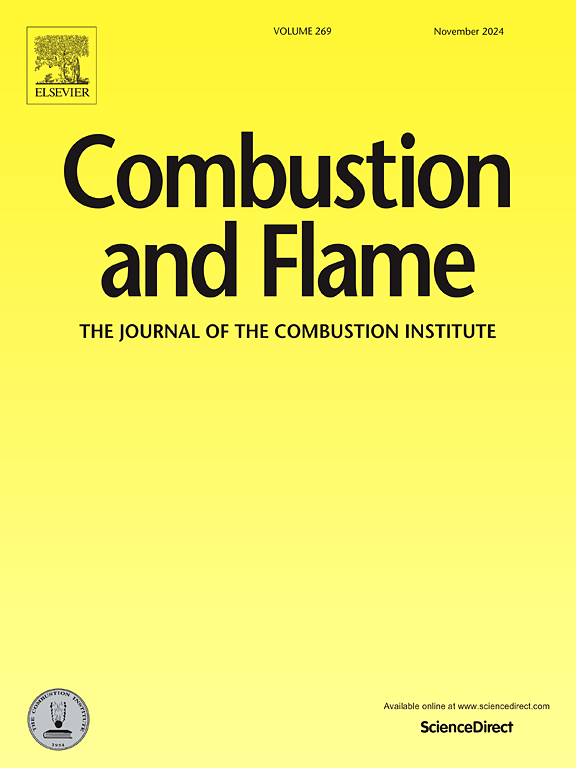A framework for obtaining frequency-dependent stability maps to mitigate thermoacoustic instabilities
IF 5.8
2区 工程技术
Q2 ENERGY & FUELS
引用次数: 0
Abstract
This paper utilizes Cauchy’s argument principle in the frequency domain to develop novel stability maps, providing guidelines for measures which can be taken to mitigate thermoacoustic instabilities in combustion appliances. The existing approaches mainly concentrate on identifying the onset of thermoacoustic instabilities by calculating unstable frequencies and growth rates. However, they provide limited practical guidance for modifying system characteristics, especially those dependent on frequency, to achieve flame stabilization. In the present contribution, several thermoacoustic stability criteria are introduced that leverage the Cauchy’s argument principle and direct evaluation of the dispersion relation’s argument. These criteria offer deeper insights and facilitate a systematic flame stabilization process by enabling modifications to both the (passive) acoustic subsystems and/or the (active) subsystem containing the combustion processes. This approach allows for a construction and comprehensive understanding of the stability map for a given thermoacoustic system, leading to more effective guidelines to elaborate and implement the combustion system stabilization strategies. To demonstrate the practical application of this framework, two illustrative thermoacoustic systems are discussed.
Novelty and significance statement This study introduces a novel framework for assessing thermoacoustic stability.
- •It provides a method for detecting the onset of thermoacoustic instability and offers valuable insights into critical frequency ranges. This approach facilitates the identification of necessary modifications in flame and acoustic subsystems across different frequencies to achieve system stabilization.
- •This framework allows for the selection of the most suitable stability criterion based on the available combustion system’s characteristics. For example, by knowing acoustic properties in both upstream and downstream components, either the DDS or DCS criterion can generate a comprehensive, frequency-dependent stability map for flame transfer function values. This approach eliminates the need for iterative integration, differential equations, or direct solutions to dispersion relations.
获取频率相关稳定性图以缓解热声不稳定性的框架
本文利用频域中的柯西论证原理绘制了新的稳定性地图,为采取措施缓解燃烧设备中的热声不稳定性提供了指导。现有方法主要集中在通过计算不稳定频率和增长率来识别热声不稳定性的开始。然而,这些方法对于改变系统特性(尤其是那些依赖于频率的特性)以实现火焰稳定所提供的实际指导非常有限。本文介绍了几种热声稳定性标准,这些标准利用了柯西论证原理和对频散关系论证的直接评估。通过对(被动)声学子系统和/或包含燃烧过程的(主动)子系统进行修改,这些标准提供了更深入的见解,并促进了系统化的火焰稳定过程。通过这种方法,可以构建并全面理解特定热声系统的稳定图,从而为制定和实施燃烧系统稳定策略提供更有效的指导。为了演示该框架的实际应用,我们讨论了两个示例热声系统。新颖性和意义声明 本研究介绍了一种评估热声稳定性的新框架。-它提供了一种检测热声不稳定性开始的方法,并为临界频率范围提供了有价值的见解。这种方法有助于确定在不同频率下对火焰和声学子系统进行必要的修改,以实现系统稳定。例如,通过了解上游和下游组件的声学特性,DDS 或 DCS 准则可为火焰传递函数值生成一个全面的、与频率相关的稳定图。这种方法无需迭代积分、微分方程或直接求解扩散关系。
本文章由计算机程序翻译,如有差异,请以英文原文为准。
求助全文
约1分钟内获得全文
求助全文
来源期刊

Combustion and Flame
工程技术-工程:化工
CiteScore
9.50
自引率
20.50%
发文量
631
审稿时长
3.8 months
期刊介绍:
The mission of the journal is to publish high quality work from experimental, theoretical, and computational investigations on the fundamentals of combustion phenomena and closely allied matters. While submissions in all pertinent areas are welcomed, past and recent focus of the journal has been on:
Development and validation of reaction kinetics, reduction of reaction mechanisms and modeling of combustion systems, including:
Conventional, alternative and surrogate fuels;
Pollutants;
Particulate and aerosol formation and abatement;
Heterogeneous processes.
Experimental, theoretical, and computational studies of laminar and turbulent combustion phenomena, including:
Premixed and non-premixed flames;
Ignition and extinction phenomena;
Flame propagation;
Flame structure;
Instabilities and swirl;
Flame spread;
Multi-phase reactants.
Advances in diagnostic and computational methods in combustion, including:
Measurement and simulation of scalar and vector properties;
Novel techniques;
State-of-the art applications.
Fundamental investigations of combustion technologies and systems, including:
Internal combustion engines;
Gas turbines;
Small- and large-scale stationary combustion and power generation;
Catalytic combustion;
Combustion synthesis;
Combustion under extreme conditions;
New concepts.
 求助内容:
求助内容: 应助结果提醒方式:
应助结果提醒方式:


